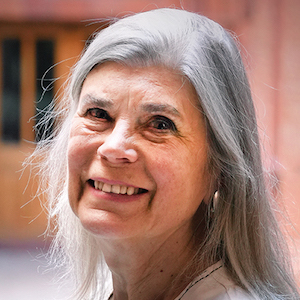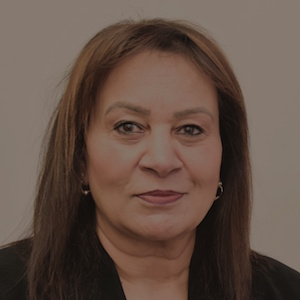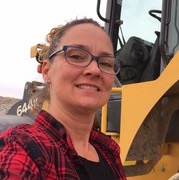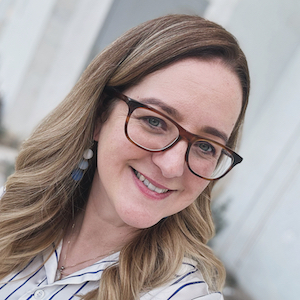
The barriers to women entering the construction industry begin at birth, veteran women in construction told a webinar this week.
All five accomplished women beaming in from Saudi Arabia, UK, South Africa, and the US revealed how they eventually discovered the industry by accident after their parents and schools were unable to conceive of a career in it.
Instead, they were left to drift, or pushed toward esteemed professions or marriage.
The “Breaking Down Barriers” webinar was part of the Global Construction Summit, organised by the Chartered Institute of Building and Global Construction Review. The Summit sponsor was Buildots.
Great expectations

CIOB president Sandi Rhys Jones said she’d always wanted to do practical things. Her engineer dad taught her woodwork, wiring, and basic DIY, and she was making her own furniture as a young teenager.
But her school had decided she was to be a classicist, whatever that was, to the extent that when she got a job at the local chemist’s, a big Boots store, her school intervened and had her moved to the books department.
She eventually got a Master’s degree in construction law and arbitration in the early 1990s, and was awarded an OBE for services to women in construction in 1998.
Married at 16

Panelist Raj Singh, now a principle project manager on the prison infrastructure team at the UK Ministry of Justice, had an arranged marriage at 16, and began thinking about work only after having her daughter at 18.
She did a stint teaching secretarial skills before stumbling into facilities management, “clumsily”, she said, before her career took hold.
Like Rhys Jones, she lamented the state of careers advice when she’d been in school, saying “typing and secretarial, that was it”.
- Watch this fascinating webinar on demand by registering here
From the catwalk to Caterpillars

From across the pond in Kansas, USA, heavy-equipment operator Kelly McClellen juggles her day job with union organising.
Among other roles, she co-chairs the Sisters Leadership Committee of the International Union of Operating Engineers, and is secretary of Heartland Women In Trades.
Although she enjoyed wood working in high school, nobody thought to mention construction as a career, even though her dad was an electrician.
In the 1990s she enrolled in a fashion career college that doubled as a modelling agency, but when she learned by chance that she could make money driving bucket loaders and other machines, she was hooked.
Medical school didn’t work out

Speaking from Port Elizabeth, South Africa, Emma Ayesu-Koranteng MCIOB is a chartered construction manager and head of the department of Building and Human Settlement Development at Nelson Mandela University.
She described how it had been decided she’d be a doctor but, when medical school didn’t work out, she found herself on a quantity surveying course, a second or third choice picked by her brother.
She found she liked it.
Bored after nine months

As a girl, Rachel Jones MCIOB wanted to be an air hostess, and was pleased to get a job at a travel agent in London’s West End, but was bored after nine months.
She tried working in recruitment, but that didn’t seem right, either.
In 1998, she saw a job advertised for a helpdesk operator at a property management firm, and her career achieved lift off.
She worked there for 11 years, describing it as the most fun she’s had in terms of learning and growth.
Now she’s in Riyadh, working as director of projects and transitions at the global real estate services company JLL MENA.
The visibility challenge
All panelists agreed that the lack of role models prevents girls and their parents from being able to imagine construction as a viable career choice.
“If you want people to get into the industry, one of the taglines you could say is ‘If you can see it, you can be it’,” said Kelly McClellen.
Emma Ayesu-Koranteng agreed.
“When we have our career evenings at schools, I make sure that if we go to certain ethnic communities I have a member of staff who can either speak the language or is from that place,” she said.
“That allows the young boys and girls to see one of their own.”
“There is good news,” said Sandi Rhys Jones.
“There are more of us, and we’re having this debate. So there is change, we just need to keep pushing it forward.”
- First broadcast on 20 February 2024, “Breaking Down Barriers: Women Succeeding in Construction” is available to watch on demand by registering here
Comments
Comments are closed.







Great article. Brought back so many forgotten memories of when I was at school back in the 90s when i told school i wanted to be a Builing Surveyer or a teacher.
Careers advice and the school pushed me down the teaching route. No advice, nothing was proffered regarding construction.
Fortunately my dad was in the industry & believed in my dreams & my sister was dating a Trainee Architect. I organised my work experience myself to take place in the school holidays at a Building Surveyors practise & school organised a work experience in a school. Construction won hands down. I fought for a place at college & uni eventually becoming the first female engineer to work in Manchester, UK back in the 90s/2000s just after the bomb devastated the heart of it.